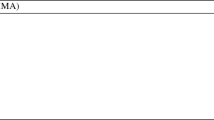Abstract
The Generalized Maximum Dispersion problem asks for a partition of a given graph into p vertex-disjoint sets, each of them having at most k vertices. The goal is to maximize the total edge-weight of the induced subgraphs. We present the first LP-based approximation algorithm.
Preview
Unable to display preview. Download preview PDF.
Similar content being viewed by others
References
Andersson, G.: An approximation algorithm for Max p-Section. In: Meinel, C., Tison, S. (eds.) STACS 1999. LNCS, vol. 1563, pp. 237–247. Springer, Heidelberg (1999)
Angluin, D., Valiant, L.G.: Fast Probabilistic Algorithms for Hamiltonian Circuits and Matchings. J. Comput. System Sci. 18(2), 155–193 (1979)
Asahiro, Y., Iwama, K., Tamaki, H., Tokuyama, T.: Greedily Finding a Dense Subgraph. J. Algorithms 34(2), 203–221 (2000)
Czygrinow, A.: Maximum dispersion problem in dense graphs. Oper. Res. Lett. 27, 223–227 (2000)
Feige, U., Kortsarz, G., Peleg, D.: The Dense k-Subgraph Problem. Algorithmica 29(3), 410–421 (2001)
Feige, U., Langberg, M.: Approximation algorithms for maximization problems arising in graph partitioning. J. Algorithms 41(2), 174–211 (2001)
Feige, U., Seltser, M.: On the Densest k-Subgraph Problem. Technical report, Department of Applied Mathematics and Computer Science, The Weizmann Institute, Rehovot (September 1997)
Fekete, S.P., Meijer, H.: Maximum Dispersion and Geometric Maximum Weight Cliques. Algorithmica 38(3), 501–511 (2003)
Frieze, A., Jerrum, M.: Improved approximation algorithms for MAX k-CUT and MAX BISECTION. Algorithmica 18, 67–81 (1997)
Goemans, M.X.: Mathematical programming and approximation algorithms. Lecture given at the Summer School on Approximate Solution of Hard Combinatorial Problems, Udine (September 1996)
Goemans, M.X., Williamson, D.P.: Improved approximation algorithms for maximum cut and satisfiability problems using semidefinite programming. J. ACM 42(6), 1115–1145 (1995)
Halperin, E., Zwick, U.: A unified framework for obtaining improved approximation algorithms for maximum graph bisection problems. Random Structures Algorithms 20(3), 382–402 (2002)
Han, Q., Ye, Y., Zhang, J.: An improved rounding method and semidefinite programming relaxation for graph partition. Math. Program. 92(3), 509–535 (2002)
Hassin, R., Rubinstein, S., Tamir, A.: Approximation algorithms for maximum dispersion. Oper. Res. Lett. 21(3), 133–137 (1997)
Jäger, G., Srivastav, A.: Improved Approximation Algorithms for Maximum Graph Partitioning Problems. J. Comb. Optim. 10(2), 133–167 (2005)
Khot, S.: Ruling Out PTAS for Graph Min-Bisection, Densest Subgraph and Bipartite Clique. In: Proceedings of the 45th Annual IEEE Symposium on Foundations of Computer Science (FOCS), pp. 136–145. IEEE Computer Society Press, Los Alamitos (2004)
Raghavan, P.: Probabilistic construction of deterministic algorithms: approximating packing integer programs. J. Comput. System Sci. 37(2), 130–143 (1988)
Ravi, S.S., Rosenkrantz, D.J., Tayi, G.K.: Heuristic and Special Case Algorithms for Dispersion Problems. Oper. Res. 42(2), 299–310 (1994)
Srivastav, A., Stangier, P.: Algorithmic Chernoff-Hoeffding inequalities in integer programming. Random Structures Algorithms 8(1), 27–58 (1996)
Srivastav, A., Wolf, K.: Finding Dense Subgraphs with Semidefinite Programming. In: Jansen, K., Rolim, J.D.P. (eds.) APPROX 1998. LNCS, vol. 1444, pp. 181–191. Springer, Heidelberg (1998)
Author information
Authors and Affiliations
Editor information
Rights and permissions
Copyright information
© 2007 Springer Berlin Heidelberg
About this paper
Cite this paper
Jäger, G., Srivastav, A., Wolf, K. (2007). Solving Generalized Maximum Dispersion with Linear Programming. In: Kao, MY., Li, XY. (eds) Algorithmic Aspects in Information and Management. AAIM 2007. Lecture Notes in Computer Science, vol 4508. Springer, Berlin, Heidelberg. https://doi.org/10.1007/978-3-540-72870-2_1
Download citation
DOI: https://doi.org/10.1007/978-3-540-72870-2_1
Publisher Name: Springer, Berlin, Heidelberg
Print ISBN: 978-3-540-72868-9
Online ISBN: 978-3-540-72870-2
eBook Packages: Computer ScienceComputer Science (R0)




